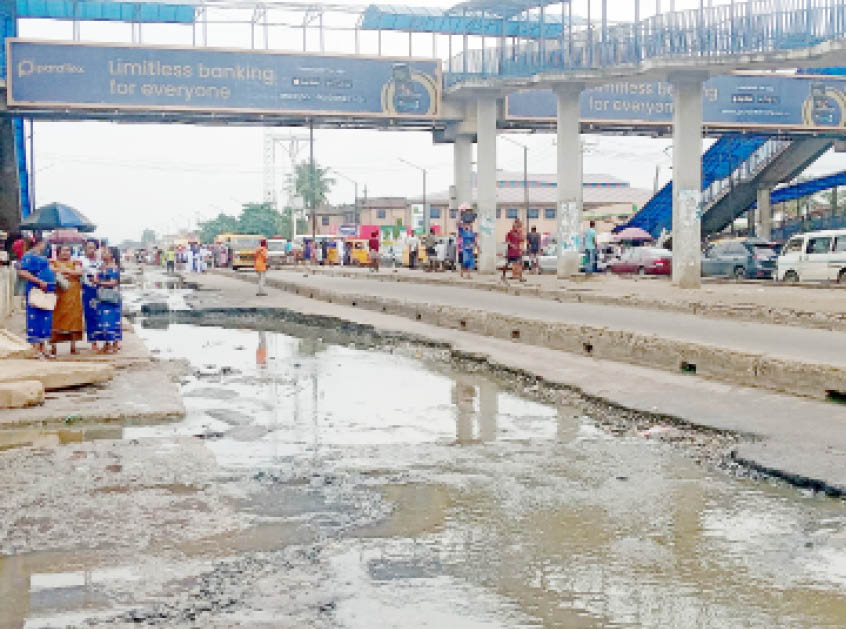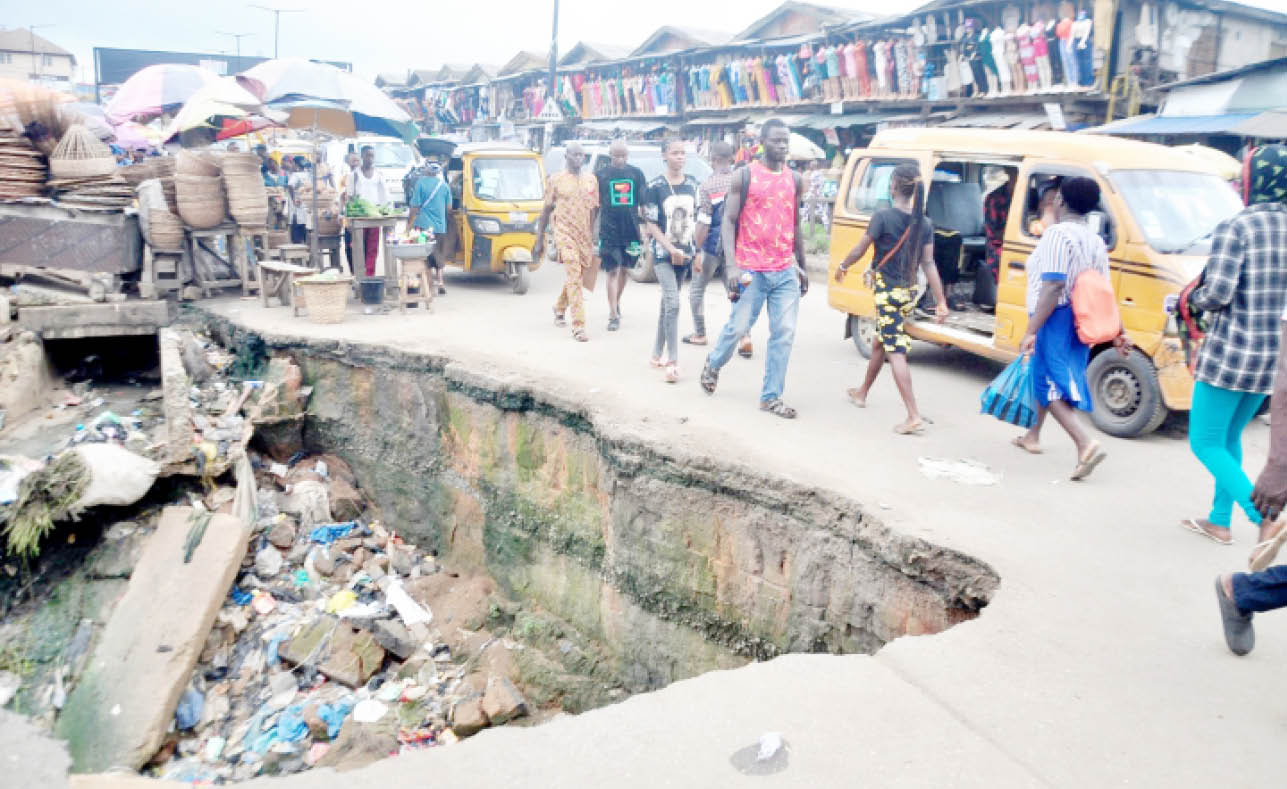Lagos, a city of bustling streets and constant movement, presents a challenge that no motorist can escape – potholes. These road pitfalls have become an unavoidable part of daily life, shaping schedules and testing patience. Daily Trust on Sunday reports.
Potholes, those dreaded road pitfalls that Lagos motorists can’t escape, are becoming an unfortunate part of their daily routines, especially as the rainy season exposes the shoddy nature of most of the roads in the sixth largest economy in Africa.
A drive through most of the 20 local government areas and 37 Local Council Development Areas (LCDAs) will reveal the sorry state of some of the roads and the plight commuters go through to navigate them. More disturbing is the fact that the potholes are everywhere, even on roads leading to the governor’s office at Alausa and to the Lagos House Marina, as well as other iconic areas in the state.
Potholes and, in some instances, gullies can be seen on Olojo Drive leading to Nigeria’s largest electronic market – Alaba international market; Mile 2 under bridge enroute Nigeria’s largest and busiest port complex, Apapa, as well as on Oba Akran Road, Kodesho Street, Airport Road and others leading to the nation’s busiest airport – Murtala Muhammed International Airport Ikeja. It is the same traversing the Third Mainland Bridge, which hosts the highest vehicular movement in the state and by extension, Nigeria. The array of potholes and gullies make it exhausting driving on Egbeda-Akowonjo Road, Agege Motor Road by Abule Egba; Ikotun-Isolo Road, Old Ojo Road in Oriade LCDA; Ozumba Mbadiwe Road in Eti-Osa, Oba Akran Avenue in Ikeja, Obafemi Awolowo Road, Alausa; Ojo, Aiyetoro and Mosafejo roads in Ajegunle to mention but a few.

These potholes and craters on the roads are eyesores to the state which was the national capital until December 1991 and serve as the entry point for most foreigners to the country.
According to e-hailing service driver, Kayode Ariyo, the poor state of the road is always one of the major complaints from commuters.
“The state of the roads is not a good representation of Lagos. Most foreigners we pick up from the Airport always complain of the poor state of the road, either we are taking them to the Mainland or Island part of the state. Roads leading to major hotels on the Mainland and Island are bad. The government has abandoned the Lekki Expressway since the people kicked against them collecting money at the Toll gates after the #ENDSARS protest,” Ariyo said.
Ariyo, who noted that the potholes are a cause of worries for drivers in the state, added that there are areas they don’t go to.
“Look at the Lagos-Abeokuta Expressway, it is almost a no-go area if not for the inner roads done by former Governor Ambode. You dare not take the express because the stagnant water and wastes have taken over a large section of the road,” he said.
Rogers Vincent, a tricyclist, berated the poor maintenance culture by the state government and its agencies.
“As long as there’s a budget for repair, we don’t do maintenance for it. Potholes are visible and everywhere,” he said.
He also pointed out that those responsible for repairing or building roads often do substandard work while late intervention by road repairers causes more damage, leading to bigger potholes.
Rufai Muideen, a car owner, claimed that “commercial drivers worsen the situation of the already bad road, and the poor quality of materials used by those responsible for repairing the roads contributes to the potholes.”
Another tricyclist, Olawale Fashehun, questioned the usefulness of the many levies the state generates from commercial drivers in the state.
“Look at the roads. The government is not even bothered about it. Look at the potholes on ACME Road where you have the party’s secretariat. Go to Ogba bus stop towards Area G, it is completely a shame to the state. The state of the road and the flood is enough to discourage the police officers in that axis,” he added.
Public Policy Expert, Dr Abimbola Oyarinu, said the state government has not lived up to expectation in the maintenance of roads in the state. While noting that what Lagos State generates annually is almost the same as Rwanda’s annual budget, Oyarinu expressed worries that it is becoming a nightmare driving on Lagos roads.
“I believe the Lagos State government has not lived up to its billing. To whom much is given, much is expected. If you look at what Lagos is generating, it is almost the same as Rwanda’s budget. However, Rwanda’s land mass is almost 20 times bigger than Lagos. It is not news that the number of cars that use Lagos roads will cause wear and tear on the road, thus reducing the lifespan of the road but that volume also contributes to the revenue of the state,” he said.
The university lecturer, who noted that potholes contribute to the gridlock in the state, challenged the state governor to show the political will to make Lagos roads motorable.
“Look at the roads constructed by Dangote in Apapa-Oshodi area using cement. That road will last 40 years instead of the 10 years average lifespan of roads built with asphalt. Can the state do a similar thing? Where is the political will? Sanwo-Olu must understand he would be assessed at the end of his government,” he added.
A grassroots politician, Israel Alaba, said the condition of the roads shows the lack of accountability on the part of the government.
“For a state that reportedly generates over N50bn monthly as IGR, there is no justification for the poor state of the roads. The havoc caused by potholes on vehicles cannot be overstated. Beyond the damage to vehicles, potholes pose a real danger to road users. The human as well as economic cost of these road craters cannot be ignored.
“Most of the crashes you see in Lagos are caused by drivers trying to avoid potholes. I know the Third Mainland bridge belongs to the FG but why can’t the state government fix the potholes there. It is becoming difficult driving on the bridge or is it until we have a major accident before the governor will start sacking and suspending people again?” he queried.

 Join Daily Trust WhatsApp Community For Quick Access To News and Happenings Around You.
Join Daily Trust WhatsApp Community For Quick Access To News and Happenings Around You.


